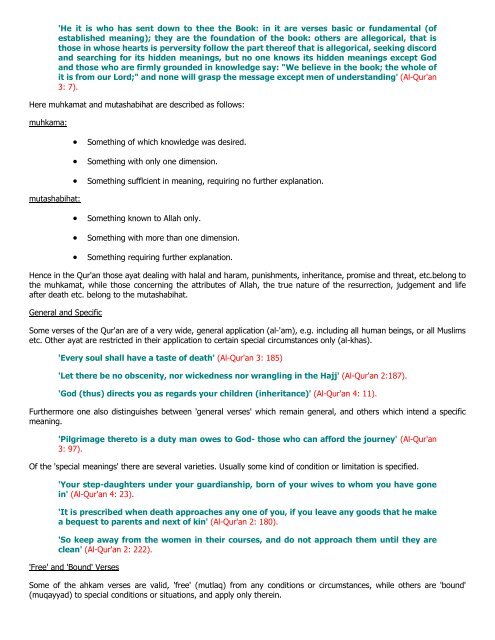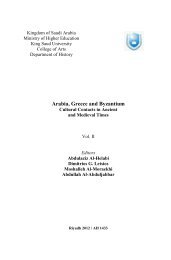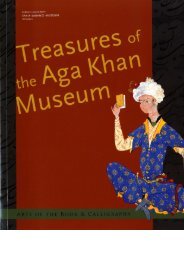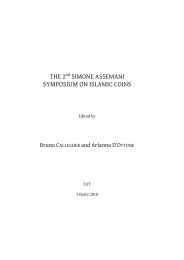ulum-al-quran
ulum-al-quran
ulum-al-quran
You also want an ePaper? Increase the reach of your titles
YUMPU automatically turns print PDFs into web optimized ePapers that Google loves.
'He it is who has sent down to thee the Book: in it are verses basic or fundament<strong>al</strong> (of<br />
established meaning); they are the foundation of the book: others are <strong>al</strong>legoric<strong>al</strong>, that is<br />
those in whose hearts is perversity follow the part thereof that is <strong>al</strong>legoric<strong>al</strong>, seeking discord<br />
and searching for its hidden meanings, but no one knows its hidden meanings except God<br />
and those who are firmly grounded in knowledge say: "We believe in the book; the whole of<br />
it is from our Lord;" and none will grasp the message except men of understanding' (Al-Qur'an<br />
3: 7).<br />
Here muhkamat and mutashabihat are described as follows:<br />
muhkama:<br />
<br />
<br />
<br />
Something of which knowledge was desired.<br />
Something with only one dimension.<br />
Something sufflcient in meaning, requiring no further explanation.<br />
mutashabihat:<br />
<br />
<br />
<br />
Something known to Allah only.<br />
Something with more than one dimension.<br />
Something requiring further explanation.<br />
Hence in the Qur'an those ayat de<strong>al</strong>ing with h<strong>al</strong><strong>al</strong> and haram, punishments, inheritance, promise and threat, etc.belong to<br />
the muhkamat, while those concerning the attributes of Allah, the true nature of the resurrection, judgement and life<br />
after death etc. belong to the mutashabihat.<br />
Gener<strong>al</strong> and Specific<br />
Some verses of the Qur'an are of a very wide, gener<strong>al</strong> application (<strong>al</strong>-'am), e.g. including <strong>al</strong>l human beings, or <strong>al</strong>l Muslims<br />
etc. Other ayat are restricted in their application to certain speci<strong>al</strong> circumstances only (<strong>al</strong>-khas).<br />
'Every soul sh<strong>al</strong>l have a taste of death' (Al-Qur'an 3: 185)<br />
'Let there be no obscenity, nor wickedness nor wrangling in the Hajj' (Al-Qur'an 2:187).<br />
'God (thus) directs you as regards your children (inheritance)' (Al-Qur'an 4: 11).<br />
Furthermore one <strong>al</strong>so distinguishes between 'gener<strong>al</strong> verses' which remain gener<strong>al</strong>, and others which intend a specific<br />
meaning.<br />
'Pilgrimage thereto is a duty man owes to God- those who can afford the journey' (Al-Qur'an<br />
3: 97).<br />
Of the 'speci<strong>al</strong> meanings' there are sever<strong>al</strong> varieties. Usu<strong>al</strong>ly some kind of condition or limitation is specified.<br />
'Your step-daughters under your guardianship, born of your wives to whom you have gone<br />
in' (Al-Qur'an 4: 23).<br />
'It is prescribed when death approaches any one of you, if you leave any goods that he make<br />
a bequest to parents and next of kin' (Al-Qur'an 2: 180).<br />
'So keep away from the women in their courses, and do not approach them until they are<br />
clean' (Al-Qur'an 2: 222).<br />
'Free' and 'Bound' Verses<br />
Some of the ahkam verses are v<strong>al</strong>id, 'free' (mutlaq) from any conditions or circumstances, while others are 'bound'<br />
(muqayyad) to speci<strong>al</strong> conditions or situations, and apply only therein.





